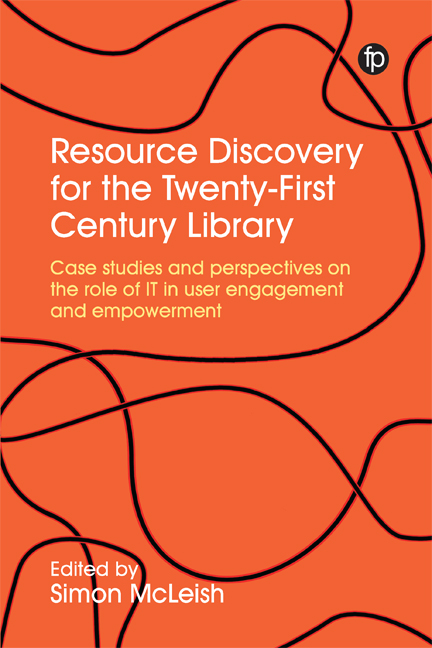Book contents
- Frontmatter
- Contents
- Figures and Tables
- Contributors
- Foreword: Library Discovery Directions
- 1 Introduction: Technology and Resource Discovery
- 2 Flipping the Catalogue: Taking Resource Discovery to the Next Level
- 3 Breaking the Record: Liberating Data into Knowledge at the National Library Board of Singapore
- 4 Case Study: Clearing Library Discovery-to-Access Pathways for IEEE Content
- 5 Case Study: Putting Discovery at the Heart of the Library Experience
- 6 Investigating Resource Discovery Needs at the University of Oxford
- 7 ‘Why Can’t you Just Use Google?’
- 8 Exposing Collections and Resources Effectively
- 9 Open Source Discovery using Blacklight at the University of Hull
- 10 A World of Curated Knowledge: Leveraging the Wider Semantic Web to Enhance Library Discovery
- 11 Cultural Discovery: Trends and Futures
- 12 Discovering the Future
- Editorial Afterword
- Index
Foreword: Library Discovery Directions
Published online by Cambridge University Press: 23 July 2020
- Frontmatter
- Contents
- Figures and Tables
- Contributors
- Foreword: Library Discovery Directions
- 1 Introduction: Technology and Resource Discovery
- 2 Flipping the Catalogue: Taking Resource Discovery to the Next Level
- 3 Breaking the Record: Liberating Data into Knowledge at the National Library Board of Singapore
- 4 Case Study: Clearing Library Discovery-to-Access Pathways for IEEE Content
- 5 Case Study: Putting Discovery at the Heart of the Library Experience
- 6 Investigating Resource Discovery Needs at the University of Oxford
- 7 ‘Why Can’t you Just Use Google?’
- 8 Exposing Collections and Resources Effectively
- 9 Open Source Discovery using Blacklight at the University of Hull
- 10 A World of Curated Knowledge: Leveraging the Wider Semantic Web to Enhance Library Discovery
- 11 Cultural Discovery: Trends and Futures
- 12 Discovering the Future
- Editorial Afterword
- Index
Summary
Introduction
The variety of topics and perspectives represented in this collection is clear evidence of the diverse scope of library discovery. In only a few years the emphasis has shifted from consideration of the development of a particular library service (the evolution from catalogue to metasearch to discovery layer) to a broader consideration of user behaviours and service development in a complex network ecosystem of offerings from libraries and third-party providers. A full appreciation of discovery and discoverability in a library environment now involves thinking about much more than the discovery layer.
(In writing this short piece I was interested to trace this evolution in two earlier pieces I have written about similar themes (Dempsey, 2006, 2012). Considered alongside this one, the three pieces are written at approximately six year intervals.)
For a sense of the diversity of the current ecosystem, consider the various current roles of Wikipedia, Google Scholar, reading lists, the library discovery layer, resource guides, Scopus and Web of Science, WorldCat, Goodreads, ResearchGate and Mendeley, ArXiv and PubMed Central. These and other resources are used by library users to find specific resources of interest to them, for serendipitous discovery and for exploration. They are used alongside library resources, and sometimes in combination with them. The transition from Google Books to a library catalogue via WorldCat, or the transition from Google Scholar to a licensed article via a registered library knowledge base, or the serendipitous discovery of special collections in Google or Wikipedia are all examples of such combinations.
In this environment, three broad related trends are of interest. First, ‘discovery often happens elsewhere’. We know that library users now search for and find materials of interest in many places. These include the network level services that are now so much a part of our network lives (Wikipedia, Google, Amazon) and more specialist resources (arXiv.org, for example). The discovered resources may be books or journals, software, research data, learning materials and so on. We also know that people may ‘discover’ materials of interest in non-library services and then turn to the library to ‘locate’ particular instances of those resources, whether these are on a shelf, licensed by the library, or potentially requestable from elsewhere. So, a user who spends time on ResearchGate, say, may turn to the library if a copy of a discovered article is not available there.
- Type
- Chapter
- Information
- Resource Discovery for the Twenty-First Century Library , pp. xxi - xxxiPublisher: FacetPrint publication year: 2020
- 2
- Cited by



